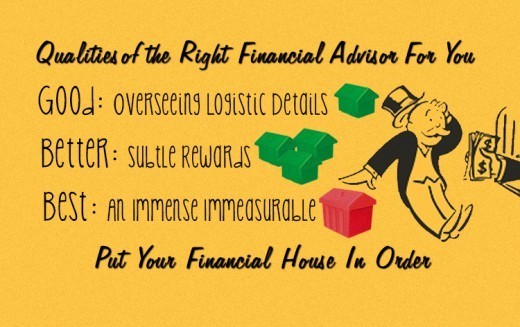
The Worth of Sage Advice Part II: “Good, Better and Best” Advisor Value

In a recent post, “Obvious Man Takes on the Wealth Advisor World,” we introduced a subject of obvious interest to us: the value we believe a financial advisor can bring to helping you manage the wealth of your life. We also promised to provide additional information throughout November to justify the claim. Today, we’ll cover why we feel most investors should find such an advisor versus going it alone. In future posts, we’ll cover where to look for a good one and how to assess his or her worth.
Money as a Means to Your End
You probably don’t need us to tell you that money isn’t synonymous with happiness. You have already figured out that part on your own. Then again, as Woody Allen has observed, “Money is better than poverty, if only for financial reasons.” So you do want to figure out how to make best use of your money in three important ways:
- Financial Value – It’s great when you have more than less money to spend on the people and passions that lead to your highest happiness.
- Life Value – Most people want to minimize the time they spend managing their money, so they can get on with the real components in their best-lived life.
- Planning Value – Life is full of surprises that call for being financially well-positioned to roll with the changes when – not if – they interrupt your regularly scheduled programming.
Compared to going it alone, a good advisor should be able to add substantial value to this trio of financial life planning needs. The value should go well beyond the advisor’s fees, or else you shouldn’t be working with him or her. Achieving balance among building your life’s wealth, responding to change, and minimizing the time and stress involved calls for a series of “good, better and best” qualities that justify partnering with the right financial advisor.
Good: Overseeing the Logistic Details
While it’s essential to keep an eye on the “big picture,” a financial advisor can also help you manage the demanding details along the way. For example, an advisor can help you:
Get organized – Assemble, prioritize and optimize your far-flung investments, estate plans, insurance policies, mortgages, executive compensation packages, retirement accounts and the rest of the mishmash of financial complexities in your busy life; ensuring no important money is being left behind or overlooked.
Remain calm – A body of evidence substantiates that most investors face enormous challenges in deciding when to buy, sell or hold tight. As Wall Street Journal columnist Jason Zweig reported in “So You Think You’re a Risk Taker?” your own brain is hard-wired to betray you into making financial choices that aren’t always in your best interest. An objective advisor can spot when this is happening, and help you avoid costly, unnecessary and nerve‐wracking trades.
Invest tax-wisely – Particularly if your advisor is or has access to CPA services, he or she can help you engage in vigilant, year‐round tax‐sensitive investing, as well as by ensuring that taxes are carefully integrated into the spectrum of your financial planning.
Build your dedicated team – Most families’ complex lives call for a team approach to fully manage their wealth. If you’re investing on your own, it can be hard to create the right financial team, let alone ensure they are playing together on your behalf. A good advisor should have relationships already in place to ensure coordinated coverage for both the routine and unusual financial challenges you may face throughout your life.
Better: Subtle Rewards
Beyond the hard‐dollar values described above, there are other ways a good advisor should contribute to your bottom‐line results.
Financial clarity – Your advisor should be enthused about helping you understand the essentials of financial theory, so you can achieve those critical “ah ha!” moments that let you participate in your own success.
Timely support – Your advisor should take over many of the paperwork-pushing details, saving you hours otherwise sacrificed to filling out forms. He or she should continually monitor and manage your wealth and share the critical results that matter in a digestible format. You should receive prompt, helpful responses to your questions or requests.
Best: An Immense Immeasurable
Let’s say you were prepared to perform all of the above functions on your own. There is still the larger consideration. Is this how you want to spend your time? Also, is this how you would want your spouse or other family members to have to spend their time if you are no longer in the picture? It can be an immeasurable comfort to have an advisor who is deeply familiar with your personal wealth, ready and able to assist with shifting your family’s financial roles when needed, smoothly, deliberately and in everyone’s best interests.
At SAGEbroadview, we’ve embodied these “good, better and best” concepts into our simple tagline: Appreciate the Wealth of Your Life®. Vanguard describes it as well in one of its investor education pieces: “A good financial advisor will also build a relationship with you that goes beyond traditional financial planning and results in a more valuable financial life-planning approach.”
Speaking of Vanguard, in a future post in this series, we’ll explore how to quantify advisor value according to a paper the firm has published about advisor “alpha.” First up, though, we’re going to share additional ways to distinguish value-added wealth advice from sales pitches in clever disguise … before you have to find out the hard way. Stay tuned.
 Sage Serendipity: What we strive to be for investors – a voice of experience and a spark of humor – the “Car Talk” brothers Tom and Ray Magliozzi have been for car owners for some 37 years. We were sorry to hear the news that Tom Magliozzi has passed away, and we hope that he’s now “laughing his ass off” (in the words of his brother) on a higher plane. Farewell, Tom!
Sage Serendipity: What we strive to be for investors – a voice of experience and a spark of humor – the “Car Talk” brothers Tom and Ray Magliozzi have been for car owners for some 37 years. We were sorry to hear the news that Tom Magliozzi has passed away, and we hope that he’s now “laughing his ass off” (in the words of his brother) on a higher plane. Farewell, Tom!
 Secure Document Sharing
Secure Document Sharing


